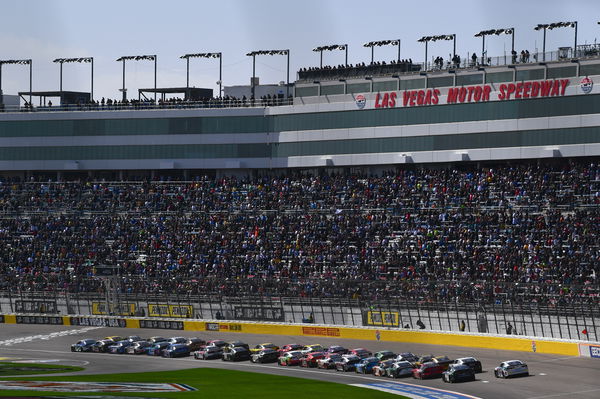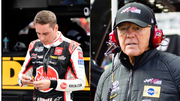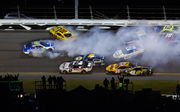
USA Today via Reuters
Mar 3, 2024; Las Vegas, Nevada, USA; NASCAR Cup Series driver Daniel Suarez (99) leads the field for the restart of the Pennzoil 400 at Las Vegas Motor Speedway. Mandatory Credit: Gary A. Vasquez-USA TODAY Sports

USA Today via Reuters
Mar 3, 2024; Las Vegas, Nevada, USA; NASCAR Cup Series driver Daniel Suarez (99) leads the field for the restart of the Pennzoil 400 at Las Vegas Motor Speedway. Mandatory Credit: Gary A. Vasquez-USA TODAY Sports
The current tug-of-war between the Cup Series teams and NASCAR over the charter negotiations is all everyone can talk about right now. However, as the teams fight to get a bigger piece of the pie, especially after the new $7.7 billion media rights deal, NASCAR seems to be ignoring a growing concern that has hampered multiple racing organizations in the past.
Non-charter racing, which once allowed investors and passionate racing enthusiasts to invest their time and money into NASCAR, has now been reduced to ashes. Back in the day, there was even a trend of ‘start and park’ which saw the field pack the full 40 spots during the race. However, ever since the charter system came into being in 2016, multiple racing teams have either closed shops or been forced to buy the charters.
There’s another aspect to it. While non-charter teams can truly make the most of fielding a race, the return on investment is just not good enough to keep their operations running. Moreover, it’s hard to single out a non-charter team that went on to contend for a championship in the recent history of NASCAR racing.
ADVERTISEMENT
Article continues below this ad
Can non-charter teams contend for the NASCAR Cup Series championship?
A charter is not just a guaranteed grid spot for a team every weekend. But it is also an avenue through which they can have a share of the revenue stream, apart from the prize pool set for the events. So ultimately, non-charter teams would have to survive just off the prize money and sponsorships (if any).
Wood Brothers Racing, a prominent name in the NASCAR scene, ran a full-time driver as a non-charter team in 2016. The driver was none other than the current reigning champion, Ryan Blaney, who was in his debut season with the team back then. Despite pulling up some solid performance, they were nowhere near the championship-contending team.
Gaunt Brothers Racing is another example of a company that had to cease its racing operations after being unable to buy a charter. Daniel Suarez, who competed for the team in the #96 Toyota car in 2020, had a similar story. Without race wins or a place in playoffs, there just wasn’t enough return on the investment. Suarez finished the season in 31st place and made his way to Trackhouse Racing.
Nowadays, teams like Rick Ware Racing and Kaulig Racing use the non-charter avenue to test the waters before committing a charter to a new driver. But, looking at the history, let’s hope the current teams do not fall into the same pitfall, where they eventually have to downsize their operations. This can be assured by NASCAR though if they choose to grant the teams’ wishes regarding ‘permanent charters’.
ADVERTISEMENT
Article continues below this ad
Trending
Teams are adamant about getting permanent status in NASCAR
Running a NASCAR Cup Series team is financially draining. Especially at a time when sponsors are hard to come by. Unlike other major sporting leagues like the MLB, NBA, NHL, and NFL, NASCAR is a family-owned business, and accepting the demand for a permanent charter would lead to the team gaining influence over the sport and thus splitting the leadership.
Michael Jordan, who co-owns and operates 23XI Racing, also shared his take on why teams are pushing for a permanent charter. “If you had permanent charters, then you could create a revenue stream, either with new investors or different type of sponsorship that would subsidize that type of variance between ownership and the league. If you don’t correct that, this sport is going to die. Not because of competition aspect, but because economically, it doesn’t make sense for any business people.”
ADVERTISEMENT
Article continues below this ad
Even NASCAR’s winningest team, Hendrick Motorsports, has not made profits in the last 10 years due to the inefficient business model of the sport. Jeff Gordon, while speaking on the Dale Jr Download podcast, explained, “I don’t think Hendrick Motorsports have made a profit in 10 years. And then you say, why do you do it? Well, it’s because Rick Hendrick loves the sport, he loves the cars and it’s good branding.” Had it not been for the strong B2B ties, they too would have been in a worrisome situation.
At the moment, both parties are in a stalemate situation. Despite the Race Team Alliance putting across their demands, the matter is no way near resolved. But they both have to hurry as the current charter agreement will end with the current season.
ADVERTISEMENT
ADVERTISEMENT
ADVERTISEMENT
ADVERTISEMENT






